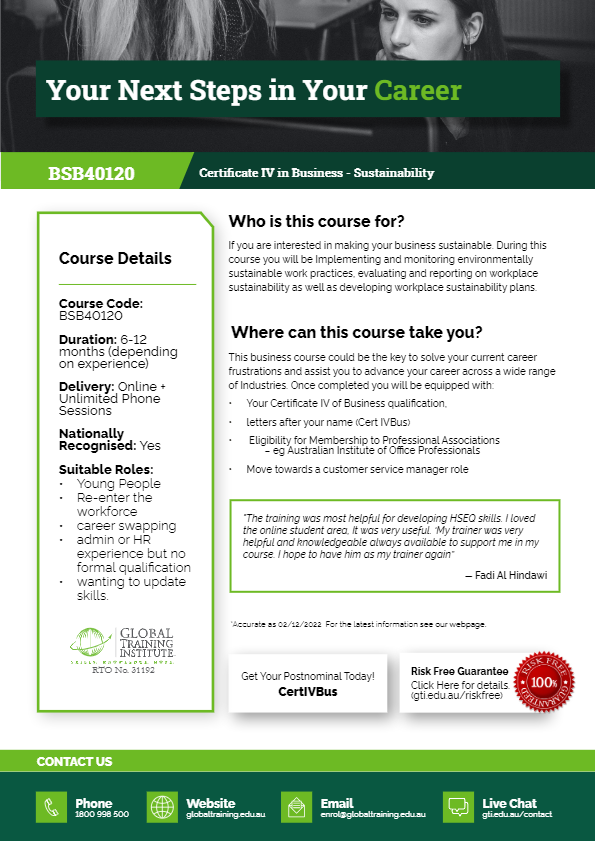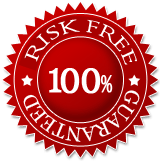Finally gain your qual that will teach you how to apply, manage and implement problem-solving skills to the environment…
Where can this course take you?
With growing populations globally, managing environments to ensure sustainable use of resources and conservation is more important than ever. With key issues facing us today like global warming, pollution, deforestation, extinction of habitats and species, new careers are opening up as we aim to preserve our future. Launch your career in environmental management with a local, national and international focus.
Understand how to critically analyse issues, solve problems, and communicate effectively with others as you tackle current and future environmental issues and develop sustainable solutions. This course aims to provide you with a solid foundation in the fields of climate change, environmental management and earth science.
It also aims to give you valuable and high in demand skills in environmental management. Understand the risks a changing climate presents to communities, businesses and the natural environment, and the economic opportunities for new sustainable industries.
Code: BSB40120
Units: 12
Length: 6-12 months (depending on experience)
Start Dates: Flexible, year-round
RPL Available: Yes
Delivery: Online
Funding Assistance: Click Here
Code: BSB40120
Units: 12
Length: 6-12 months (depending on experience)
Start Dates: Flexible, year-round
RPL Available: Yes
Delivery: Online
Funding Assistance: Click Here
Finally gain your qual that will teach you how to apply, manage and implement problem-solving skills to the environment…
Where can this course take you?
With growing populations globally, managing environments to ensure sustainable use of resources and conservation is more important than ever. With key issues facing us today like global warming, pollution, deforestation, extinction of habitats and species, new careers are opening up as we aim to preserve our future. Launch your career in environmental management with a local, national and international focus.
Understand how to critically analyse issues, solve problems, and communicate effectively with others as you tackle current and future environmental issues and develop sustainable solutions. This course aims to provide you with a solid foundation in the fields of climate change, environmental management and earth science.
It also aims to give you valuable and high in-demand skills in environmental management. Understand the risks a changing climate presents to communities, businesses and the natural environment, and the economic opportunities for new sustainable industries.
Progress Your Career to become a…
Many organisations are now wanting their WHS Officer to also be across the Environmental and sustainability aspects for their organisation. This will involve you creating and ensuring implementation of company policies and procedures across the organisation.
As a Sustainability Officer you will be responsible for managing a projects ecological footprint, ensuring it meets or exceed any environmental requirements. This role often involves reporting on different areas of the project workflow, maintaining a commitment to quality and sustainability across each stage of the job.
This job role involves day to day inspections of a project to assess its compliance with environmental regulations. This often means getting out in the field and doing in person inspection to ensure the aims of the project are met.
Who is this course for?
- If you have an interest in environmental management or sustainability for a workplace environement.
- Interested in looking at carbon footprints, reducing waste, and policies and procedures involving environmental management and sustainability.
- Be able to measure and address enterprise impacts on air, water and other external environmental conditions.
- Entrepreneurial individuals looking to launch their own business considering sustainability standards.
- Business managers or business owners who are interested in becoming qualified and improving the sustainability standards of the business.
This qualification is a perfect pathway towards environmental management.
Who is this course for?
- Learners who are looking to develop their skills, knowledge and career opportunities in the Sustainability market. Be able to measure and address enterprise impacts on air, water and other external environmental conditions.
- Entrepreneurial individuals looking to launch their own business considering sustainability standards.
- Business managers or business owners who are interested in becoming qualified and improving the sustainability standards of the business.
This qualification is a perfect pathway towards environmental management.
Course Overview
COURSE: Certificate IV in Business (Sustainability)
CODE: BSB40120
IDEAL FOR: Asset Managers, Risk managers, Policy Developers, Strategic Planners…
UNITS: 12
DURATION: 6-12 months (depending on experience)
DELIVERY: Online + Unlimited Phone Sessions
ENTRY REQUIREMENTS:
Age: 21 Years or over; or
If under 21 (must be over 18), have a Certificate III + 2 years relevant work experience; or
If under 21 (must be over 18), have proof of high level of skills that may lead to an interview for possible enrolment
Academic Suitability: Proof of completing:
– Year 12/Senior Certificate; or
– Certificate III + 2 years relevant work experience; or
– Pass a GTI Language, Literacy and Numeracy test
English language: see ‘English Requirements’ in the footer of the website for more information.
Resource Requirements: Students are required to have access to the internet and a computer in order to access their materials online.
General: Motivation and good reason to complete qualification
NOTE: If an applicant does not meet the following criteria but believes they are capable, they will need to book a meeting with the Training Manager/Director and the enrolment may be accepted at their discretion.
*Requirements listed here do not apply to Traineeship qualifications.
RPL: Yes
START DATES: Flexible, Year-Round
FUNDING ASSISTANCE: Click Here
Why complete your qualification with GTI?
-
Help gain your next Promotion
-
Formally recognise your work skills
-
Prove your experience
-
Learn new skills
-
No heavy theory, no essays, no exams
-
Online 24/7 access to resources and assessments
-
Training and assessments that relate to Your work and industry





